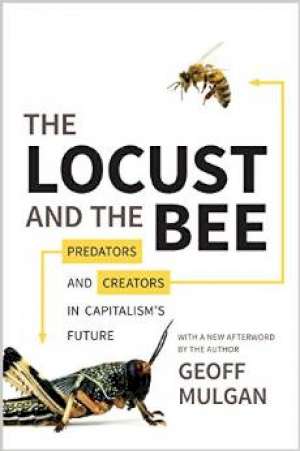16 January 2015
The Locust and the Bee
Predators and Creators in Capitalism’s Future
Geoff Mulgan
2013, Princeton University Press, 344 pages, £19.95
ISBN 9780691146966344
Reviewer: Rebecca Harding, Delta Economics

This book is a timely reminder that, in the wake of the financial crisis, there are still more questions about what has been learned by capitalists and capitalism than there are answers. The book, started as it was at the onset of the crisis in 2007, is a reflection of the disappointment that those on the political Left of centre feel about the failure of capitalism to re-configure itself after the crisis; but, equally, it is a reflection of their failure to find an alternative.
Mulgan’s aim is to demonstrate to the reader how capitalism itself is fluid and dynamic; it can evolve as challenges to it arise and this, in essence, is both its beauty and its downfall. He defines two types of capitalism: ‘Bee’ capitalism, which is productive, creative and entrepreneurial; and ‘Locust’ capitalism, which is predatory and exploitative. In essence, his argument is simple: that capitalism post-crisis should become like the bees: socially driven, connected and collaborative rather than like the locusts who strip the economy of its value while giving nothing back in return.
The chapters in the book are dedicated to exploring this dual character of capitalism. In a post-industrial and post-crisis world, the capacity to create and destroy simultaneously means that the questions are no longer about how we engage with a market but rather, how we engage with the system itself to make it work better to achieve positive social outcomes. Mulgan provocatively states that the conflict leaves, “Paradoxical people, with more than enough to live on, but struggling to find enough to live for, and with more than enough means but not enough meaning.”
In a world where one in four children in the UK live in poverty according to the Child Poverty Action Group and nearly half the world’s population live on less than 2.5 dollars a day according to the World Bank, this conclusion is somewhat complacent and should be treated with scepticism. It does, however, illustrate well the challenges that the Left in the UK faces at present. Mulgan rightly identifies the fact that capitalism fails to produce fair outcomes but wrongly, in my view, substitutes the word “value” for “wealth” and “creativity and entrepreneurialism” for “markets” and therefore obscures the real issues. After all, it is the entrepreneur who creates markets and excess profits which fuel innovation in the short term.
What Mulgan is trying to do is laudable. He is trying to re-cast the debate on the ‘Future of Capitalism’ in terms that will be essential, not just to the future of the market economy, but also to the future of mankind. Ways of harnessing the natural world and social innovation feature strongly in his resolution to the paradoxes he sees producing a, “Different kind of capitalism that is better oriented to life, creativity and cooperation, and reconnects its representations of value to the lived value that underpins them.” No-one can doubt the sincerity of his message, the intellectual rigour he applies, or the beauty of the English he writes.
What he fails to do is apply the tools of capitalism itself to finding solutions to its own problems. I believe that what he trying to say is that it is not wealth itself, or profit itself, that is the bad thing. It is what is done with that wealth or that profit. The financial crisis had not fully worked through by the time he completed the book; indeed, issues of sovereign debt and emerging market debt still threaten the system. This is not a book that will provide answers to the systemic failings of the past few years, nor does it set out to do that. But it is a book that gives you hope that there is a new form of benign capitalism just around the corner if we can all believe in it for long enough.
